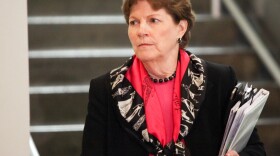
Peter Overby
Peter Overby has covered Washington power, money, and influence since a foresighted NPR editor created the beat in 1994.
Overby has covered scandals involving House Speaker Newt Gingrich, President Bill Clinton, lobbyist Jack Abramoff and others. He tracked the rise of campaign finance regulation as Congress passed campaign finance reform laws, and the rise of deregulation as Citizens United and other Supreme Court decisions rolled those laws back.
During President Trump's first year in office, Overby was on a team of NPR journalists covering conflicts of interest sparked by the Trump family business. He did some of the early investigations of dark money, dissecting a money network that influenced a Michigan judicial election in 2013, and — working with the Center for Investigative Reporting — surfacing below-the-radar attack groups in the 2008 presidential election.
In 2009, Overby co-reported Dollar Politics, a multimedia series on lawmakers, lobbyists and money as the Senate debated the Affordable Care Act. The series received an award for excellence from the Capitol Hill-based Radio and Television Correspondents Association. Earlier, he won an Alfred I. duPont-Columbia University Silver Baton for his coverage of the 2000 elections and 2001 Senate debate on campaign finance reform.
Prior to NPR, Overby was an editor/reporter for Common Cause Magazine, where he shared an Investigative Reporters and Editors award. He worked on daily newspapers for 10 years, and has freelanced for publications ranging from Utne Reader and the Congressional Quarterly Guide To Congress to the Los Angeles Times and Washington Post.
-
Well-heeled outside groups easily outspent Sen. Thad Cochran and challenger Chris McDaniel before the GOP Senate primary in Mississippi. They're going all in on the runoff election later this month.
-
Tea Party candidates did well in GOP primary elections in 2010 and 2012; this year, not so much. Part of this lack of success is because establishment candidates have generally out-raised them.
-
Crossroads GPS, the social welfare organization guided by conservative strategist Karl Rove, is practically invisible so far in the midterm political battles.
-
The latest Supreme Court ruling easing campaign finance laws could trigger a challenge to pay-to-play laws. That would affect two governors with national ambitions: Andrew Cuomo and Chris Christie.
-
As the U.S. seeks to penalize Russia, the country still has a strong lobbying presence in D.C. How much of a pariah must a nation become before it loses its public presence in the U.S. capital?
-
Hedge fund billionaires Thomas Steyer and Paul Singer are among those deploying their money to promote their issue agendas. Selected congressional candidates will receive political contributions.
-
There was a time when secretaries of state were seen as little more than functionaries. That view changed in 2000's Florida presidential election recount, which starred Katherine Harris. Now, secretaries of state are involved in implementing new state laws that have been making it either easier or harder for non-traditional voters to cast ballots — with decidedly partisan implications.
-
The midterm congressional elections are 10 months away. But some political and ideological organizations are already buying ads to criticize incumbents they hope to take down in November, like Democratic Sen. Jeanne Shaheen.
-
The Federal Election Commission has rejected a bid by conservatives to weaken the campaign-finance disclosure law. A Tea Party group had asked for a precedent-changing decision to keep its donor lists secret. It said members are being targeted for harassment and intimidation.
-
The Federal Election Commission is expected to vote Thursday on a proposal to allow virtual currency contributions to political action committees.




